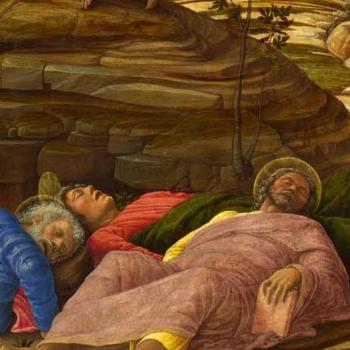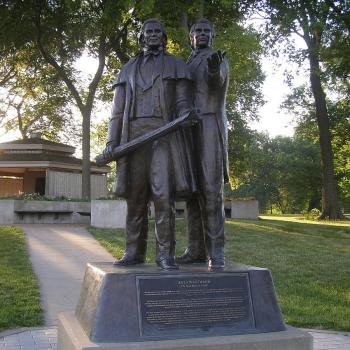But that cannot be all that the speeches mean. Why spend 124 verses to say "Shut up"? Seems a waste, don't you think? Nor does it answer the question of just who God is. If God is merely saying, "I am bigger and smarter than you, and you have no business suggesting that you know anything worth knowing about me," then the book ends with a theological thud. Neither the friends nor Job ever deny that God is bigger and smarter than they. But too many readers have concluded that that is all Job and we learn from YHWH's grand address.
I say no. When God begins the speech by saying that the very design of things has been "darkened" by the debate, that implies that something of that design is about to be revealed. And so it is. In the midst of a long creational (38:4-21), meteorological (38:22-38), and zoological (38:39-39:30) sermon, YHWH begins to reveal something of the real design of the universe, and it sure is not a mechanical place of rewards and punishments. At 38:25-27 YHWH says to Job that there are places in God's universe where rain falls, enabling grass to grow, but no human ever sees it. Thus, Job and his friends are not at all the only important things in the universe. Every animal mentioned by YHWH (including the so-called war horse of 39:19-25) is in fact finally ungovernable by humans. Again we learn that the world does not revolve around my sins or righteous deeds and God's immediate response to them, but some animals die that others may live, as the life of the hawk makes clear (39:26-30).
And in 40:9-14 YHWH challenges Job to act just as Job thinks YHWH acts, namely "treading down the wicked where they stand" (40:12). If Job can do that, then YHWH "will acknowledge to you that your own right hand can give you victory" (40:14). But of course Job cannot do that, precisely because YHWH does not do that either! The foolish notion that God rewards and punishes in easily graspable actions is completely false; the design of the universe does not include such mechanisms. And when YHWH then shows Job the great monster of chaos, Behemoth (decidedly not some kind of simple hippopotamus but a Canaanite mythological beast of gigantic size), and announces that YHWH "made him just as I made you" (40:15), it becomes clear that the universe of YHWH is no easy place to understand. Behemoth is the bringer of earthquake, arching his back under the ground when aroused, and he too is a creation of YHWH.
Thus are the simplistic platitudes of Job and his friends made fun of; God's world is nothing like any one of them imagined. The real God has at last stood up, and that God is new and mysterious and not easily understood. The 124-verse double speeches of YHWH both reject the arguments about God from Job and friends and begin to reveal something of the nature of this wonderful and fast-moving God who acts in ways and by means unimagined by the characters of this drama. And finally Job will begin to understand, and the friends will be chastened and silenced.
Does Job offer an easy response to our opening question? Decidedly not. But after YHWH's speech, we may be able to say with Job that our old "hearing of the ear" needs a more active and personal "seeing of the eye" if we are to catch sight of the real God for whom we all seek.





